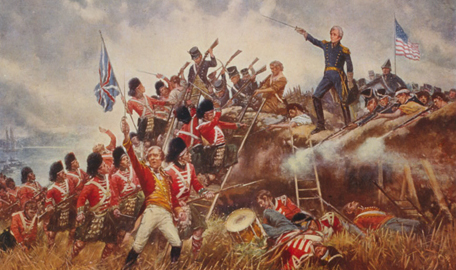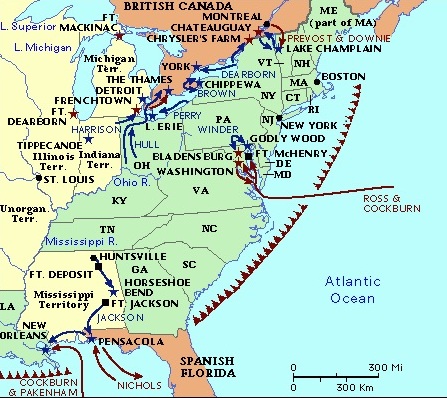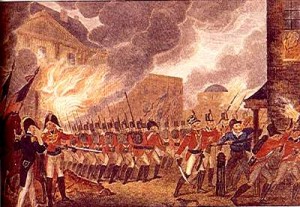|
|
|
(1812-1815) |
|
(1812-1815) Andrew
Jackson at the Battle of New
Orleans The
War of 1812 was a conflict between the
fairly new nation called the United
States of America, and on the other
side the United Kingdom of Great
Britain and Ireland and its North
American colonies in Canada.
The
war began in 1812 and ended in 1815.
Over 1,600 British and 2,260 American
soldiers, marines, and sailors perished
in this war on both land and on the
ocean. While at war with the United
States, Britain was also fighting
against France and her allies in
Europe. Due
to their war with France, the British
sought to restrict American trade with
France, and imposed a set of
restrictions which the U.S. considered
illegal under international law. The
U.S. declared war on Britain on July
18, 1812 after years of enduring
British restrictions and attacks on
American shipping, the forcible
impressment of thousands of American
sailors into service with the British
navy, increasing anger at British
restraints on American trade with
France and other European nations, and
frustration at continuing British
military support for Native Americans
fighting against the expanding United
States. Also
fueling the desire for war with Britain
was a feeling that Britain never truly
gave up thinking of America as a "lost"
colony that should be punished. Many
pro-war American saw a new war with
Britain as a reaffirmation of American
independence; in fact, the war became
known as the Second War of
Independence. When
war was declared by the United States
in the summer of 1812, the American
military was woefully unprepared for
conflict with the world's most powerful
empire. Even though the British were
engaged in a life and death struggle
with Napoleon's France, troops were
sent to reinforce British Canada and to
battle the Americans. The
war that developed was a repeat of the
American desire to invade and absorb
Canada. Just as in the American
Revolutionary War, British and Canadian
forces beat back an American invasion.
Modern Canadians trace the first true
inkling of their nationhood to this war
and the Canadian contribution to their
own defense. As
with many aspects of politics and
public policy, this new war with
Britain was popular in some regions of
the United States, and vastly unpopular
in others. However, the
British
Burning of
Washington
on August 24, 1814, in which the White
House and the Capital Building were
burned by invading British troops,
enraged all sections of the country in
enmity towards the British. Ironically,
while many of the battles of the War of
1812 resulted in American defeat and
humiliation, the greatest American
victory on land came at the Battle of
New Orleans, in 1815, which actually
took place after the signing of the
Treaty of Ghent, which would end the
war. The American victory at New
Orleans produced a national hero in
General Andrew Jackson, which would
help propel him into the (rebuilt)
White House in later years. The
Burning of the White House and the
Capital in Washington,
D.C. Who
won the War of 1812? Basically, the War
of 1812 ended in a draw. Per the Treaty
of Ghent, which ended the war, neither
the U.S., nor Britain lost or gained
any territory. The only real change was
that American fishermen gained the
right to fish in the Gulf of Saint
Lawrence. However, perception
is often taken for reality. In the
U.S., the war was seen as a victory due
to the belief that the mighty British
Empire had been held off. While the
issue of the impressment of American
sailors by the British was not dealt
with in the treaty, the British no
longer employed that recruitment tactic
after the war. In Canada, the war
was also seen as a victory, as the
American invasion had been held off,
and this conflict is seen in Canada as
a major milestone in Canadian national
development. The British view was
basically that this pesky sidenote to
the world war against Napoleon was
finally over, and it had not adversely
affected the outcome of their much more
important war with France. The real losers of
this war were the Native Americans,
whose lands were now more firmly in
U.S. hands, and who could no longer
rely on British aid against the
Americans. U.S. Military
Personnel During the War of
1812: U.S. Military Deaths
and Wounded in the War of 1812: (Battle
Casualties) Navy:
265 Marines:
45 4,505
Wounded Navy:
439 Marines:
66 *An estimated
15,000 total deaths occurred due to
the war on the American side. As is
typical of warfare in this era, more
deaths occurred from disease and
other causes than through actual
battle wounds and causes. British Military
Deaths and Wounded in the War of 1812:
(Battle Casualties) 3,679
Wounded British Military
Deaths and Wounded in the War of 1812:
(Non-Battle Casualties) American Military
Expenditures during the War of
1812: Money Borrowed by
the Federal Government During the War
of 1812: General
Society of the War
of
1812--Preserving
the records and
other documents
relating to the
war, caring for
its veterans'
graves of
veterans, and
encouraging
patriotism among
all
Americans. War
of
1812--Articles,
links and
reenactment
information. Roster
of Ohio Soldiers
in the War of
1812--Searchable
database of
records for
officers and
enlisted men from
the Adjutant
General
records. Virtualology:
War of
1812--Features
the text of the
British account of
the capture of
Washington D.C. as
reported in The
Columbian
Centinel, December
7,
1814. War
of
1812--Includes
summary of the war
and brief
descriptions of
major
battles. Fort
Erie War of 1812
Re-enactment
Units--Aid
to all military
units who portray
the period in time
known as the War
of
1812. Battles
and Campaigns of the War of
1812 Battles: 1812
U.S. Offensive: DATES
OF CONFLICT: BEGAN:
July 18, 1812--The U.S.
Congress declared war on
Britain. ENDED:
Diplomatic
& Legal End: December,
1814, The signing of
the Treaty of Ghent
officially ended the
conflict, though several
battles would still be
fought. Military
End: February 20,
1815--In the last
military action of the war,
the USS Constitution
defeated two British
warships, the HMS
Cyane and the HMS
Levant. This
occurred almost two months
after the Treaty of Ghent
actually ended the war.
Slow communications
prevented these ships from
knowing about the war's
end. Predecessor
Conflicts: (Prior related
conflicts) The
American War of
Independence
(1775-1783) Chesapeake
Incident
(1807)
The
Napoleonic Wars
(1800s)
*
U.S.-British
Conflicts: Oregon
Territory Dispute
(1840s) "Pig
War" (1800s) Venezuela
Border Dispute
(1890s) General
Society of the War of
1812--Preserving
the records and other documents
relating to the war, caring for its
veterans' graves of veterans, and
encouraging patriotism among all
Americans. War
of
1812--Wikipedia
article U.S.
Army Campaigns: The War of
1812--From
Army.mil Leading
Myths of the War of
1812--article
by War of 1812 Historian, Don
Hickey War
of
1812--Articles,
links and reenactment
information. Roster
of Ohio Soldiers in the War of
1812--Searchable
database of records for officers and
enlisted men from the Adjutant General
records. Virtualology:
War of
1812--Features
the text of the British account of the
capture of Washington D.C. as reported
in The Columbian Centinel, December 7,
1814. War
of
1812--Includes
summary of the war and brief
descriptions of major
battles. Fort
Erie War of 1812 Re-enactment
Units--Aid
to all military units who portray the
period in time known as the War of
1812. The
War of 1812 in the News
Media In
Britain, These Colonies Are
History--By
Kevin Sullivan,Washington Post Foreign
Service-May 5, 2007 Munro'
resolution on the War of 1812 passes
unanimously
--King
Township Sentinel--April 11,
2007 War
of 1812 clash left home marked with
soldiers'
blood--by
Adam Mayers, Toronto Star --May
03, 2007 04:30 AM Battle
of Cook's Mills decisive moment in
Welland's
history--The
Welland Tribune - May 03, 2007
Making
a soldier's meal of Quebec
history--By
John Masters, Vancouver Courier--April
25, 2007 "The
History Guy" is a Registered Trademark. Contact
the webmaster |

 War
of 1812 Map
War
of 1812 Map